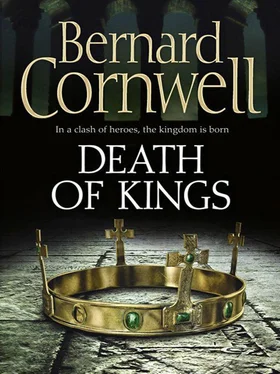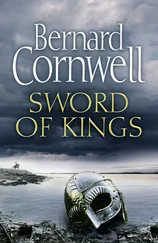I thought about that. I could hear the sound of blades on blades outside the hall, the sound of steel hammering linden-wood shields. My men were practising. All day, every day, men rehearse warfare, using sword and shield, axe and shield, spear and shield, readying themselves for the day when they must face Danes who practise just as much. That day, it seemed, was being delayed by Sigurd’s bad health. We should attack instead, I thought, but to invade northern Mercia I needed troops from Wessex, and Edward had been advised by the Witan to keep Britain’s fragile peace.
‘Ælfadell is dangerous,’ Offa interrupted my thoughts.
‘An old woman babbling her master’s words?’
‘And men believe her,’ he said, ‘and men who believe they know fate do not fear risk.’
I thought of Sigurd’s foolhardy attack on the bridge at Eanulfsbirig and knew Offa was right. The Danes might be waiting to attack, but all the time they were hearing magical prophecies that told them they would win. And rumours of those prophecies were spreading through the Saxon lands. Wyrd bi  ful
ful  ræd. I had an idea, and opened my mouth to speak, then thought better of it. If a man wants to keep a secret then Offa was the last man to tell because he made his living betraying other men’s secrets. ‘You were about to speak, lord?’ he asked.
ræd. I had an idea, and opened my mouth to speak, then thought better of it. If a man wants to keep a secret then Offa was the last man to tell because he made his living betraying other men’s secrets. ‘You were about to speak, lord?’ he asked.
‘What do you hear about the Lady Ecgwynn?’ I asked.
He looked surprised. ‘I thought you knew more about her than I do.’
‘I know she died,’ I said.
‘She was frivolous,’ Offa said disapprovingly, ‘but very lovely. Elfin.’
‘And married?’
He shrugged. ‘I hear a priest performed a ceremony, but there was no contract between Edward and her father. Bishop Swithwulf’s no fool! He refused to allow it. So was the marriage legal?’
‘If a priest performed it.’
‘Marriage requires a contract,’ Offa said sternly. ‘They weren’t two peasants humping like pigs in a mud-floored hut, but a king and a bishop’s daughter. Of course there must be a contract, and a bride-price! Without those? It’s just a royal rut.’
‘So the children are illegitimate?’
‘That’s what the Witan of Wessex says, so it must be true.’
I smiled. ‘They’re sickly children,’ I lied, ‘and most unlikely to live.’
Offa could not hide his interest. ‘Truly?’
‘Æthelflaed can’t persuade the boy to suckle his wet nurse,’ I lied again, ‘and the girl is frail. Not that it matters if they die, they’re illegitimate.’
‘Their deaths would solve many problems,’ Offa said.
So I had done Edward one small service by spreading a rumour that would please Æthelhelm, his father-in-law. In truth the twins were healthy, squalling babies, and problems in the making, but problems that could wait, just as Cnut had decided that his invasion of southern Mercia and Wessex must wait.
There are seasons of our lives when nothing seems to be happening, when no smoke betrays a burned town or homestead and few tears are shed for the newly dead. I have learned not to trust those times, because if the world is at peace then it means someone is planning war.
Spring came and with it Edward’s coronation at Cyninges Tun, the King’s town, which lay just west of Lundene. I thought it a strange choice. Wintanceaster was the main town of Wessex where Alfred had built his great new church and where the largest royal palace stood, but Edward had chosen Cyninges Tun. It was true that it was a great royal estate, but of late it had been ignored because it was too close to Lundene and, before I captured that city from the Danes, Cyninges Tun had been plundered again and again. ‘The archbishop says it’s where some of the old monarchs were crowned,’ Edward explained to me, ‘and there’s a stone here.’
‘A stone, lord?’
He nodded. ‘It’s a royal stone. The old kings either stood on it or sat on it, I’m not sure which.’ He shrugged, evidently confused by the stone’s purpose. ‘Plegmund thinks it’s important.’
I had been summoned to the royal estate a week before the ceremonies and ordered to bring as many household warriors as I could muster. I had seventy-four men, all mounted, all well-equipped, and Edward added a hundred of his own men and asked that we protect Cyninges Tun during his crowning. He feared that the Danes would attack and I gladly agreed to keep guard. I would much rather have been on horseback under the open skies than sitting and standing through hours of Christian ceremony, and so I rode the empty countryside while Edward sat or stood on the royal stone and had his head anointed with holy oil and then crowned with his father’s emerald-studded crown.
No Danes attacked. I had been so sure that Alfred’s death would mean war, but it brought one of those strange periods during which swords rested in their scabbards, and Edward was crowned in peace and afterwards he went to Lundene and summoned me there to a great council. The streets of the old Roman city were hung with banners, all in celebration of Edward’s coronation, while the formidable ramparts were thick with troops. None of that was surprising, but what was astonishing was to find Eohric there.
King Eohric of East Anglia, who had conspired to kill me, was in Lundene by invitation of Archbishop Plegmund who had sent two of his own nephews as hostages to guarantee the king’s safety. Eohric and his followers had come up the Temes in three lion-prowed boats and were now quartered in the great Mercian palace that crowned the hill at the centre of the old Roman city. Eohric was a big man, bellied like a pregnant sow, strong as a bullock, with a suspicious, small-eyed face. I first saw him on the ramparts where he was walking with a group of his men along the old Roman defences. He had three wolfhounds on leashes and their presence on the ramparts was provoking the dogs in the city beneath to howl. Weohstan, the commander of the garrison, was Eohric’s guide, presumably because Edward had ordered him to show the East Anglian king whatever he wanted to see.
I was with Finan. We climbed to the ramparts up a Roman stair built into one tower of the gate that men called the Bishop’s Gate. It was morning, and the sun was warming the old stone. It stank because the ditch outside the wall was filling with refuse and offal. Children were scavenging there.
A dozen West Saxon soldiers were clearing the way for Eohric’s men, but they let me alone and Finan and I just waited as the East Anglians approached us. Weohstan looked alarmed, perhaps because Finan and I were both wearing swords, though neither of us had mail or helmets or shields. I bowed to the king. ‘You’ve met the Lord Uhtred?’ Weohstan asked Eohric.
The small eyes stared at me. One of the wolfhounds snarled and was quietened. ‘The burner of boats,’ Eohric said, clearly amused.
‘He burns towns too,’ Finan could not resist saying, reminding Eohric that I had burned his fine port at Dumnoc.
Eohric’s mouth tightened, but he did not rise to the bait. Instead he glanced south at the city. ‘A fine place, Lord Uhtred.’
‘May I ask what brings you here, lord King?’ I asked respectfully.
‘I am a Christian,’ Eohric said. His voice was a rumble, impressive and deep, ‘and the Holy Father in Rome tells me that Plegmund is my spiritual father. The archbishop invited me, I came.’
‘We’re honoured,’ I said, because what else do you say to a king?
‘Weohstan tells me you captured the city,’ Eohric said. He sounded bored, like a man who knows he must make conversation, but is not interested in what is being said.
Читать дальше
Конец ознакомительного отрывка
Купить книгу

 ful
ful  ræd. I had an idea, and opened my mouth to speak, then thought better of it. If a man wants to keep a secret then Offa was the last man to tell because he made his living betraying other men’s secrets. ‘You were about to speak, lord?’ he asked.
ræd. I had an idea, and opened my mouth to speak, then thought better of it. If a man wants to keep a secret then Offa was the last man to tell because he made his living betraying other men’s secrets. ‘You were about to speak, lord?’ he asked.










